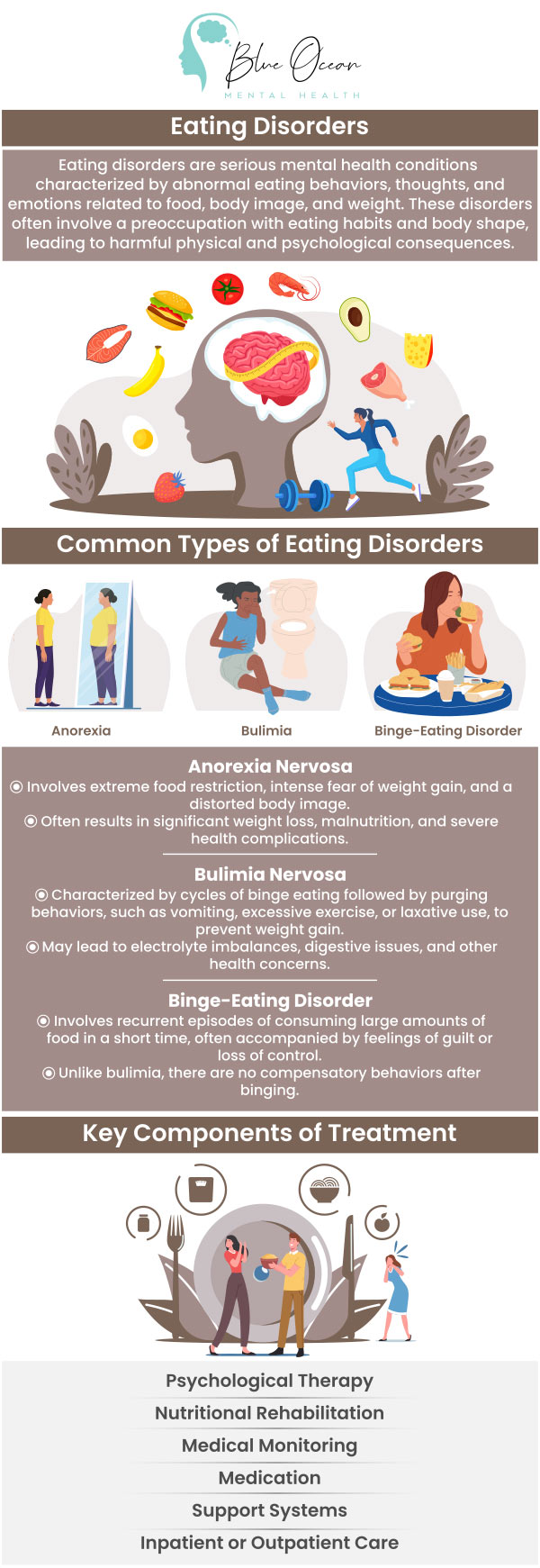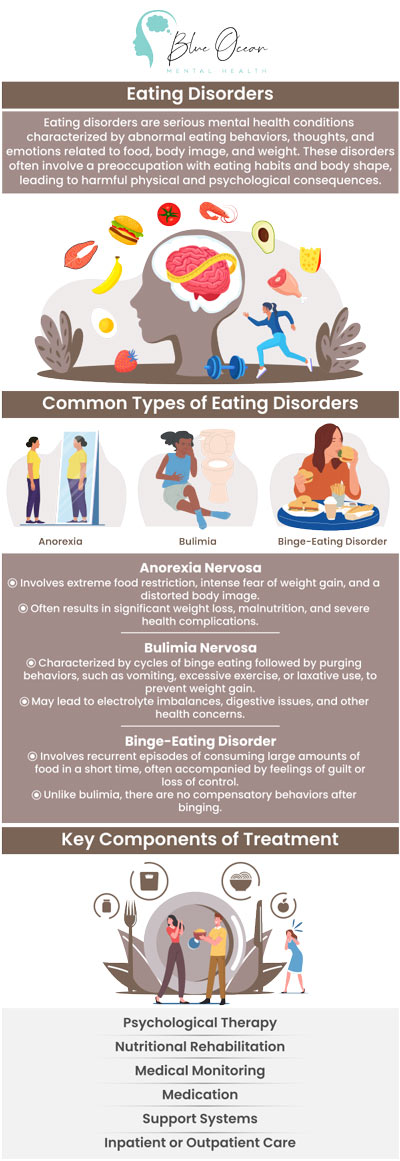Eating Disorders Treatment Specialist in Los Angeles, CA
An eating disorder is a mental health condition marked by unhealthy eating habits like extreme dieting, overeating, or obsessing over body weight and shape. Common types include anorexia, bulimia, and binge eating disorder, all of which can lead to serious physical and emotional consequences. Seeking help from Esder Shin, PMHNP, BC is crucial for treatment, as they can offer tailored support and care to foster healthier relationships with food and body image. For more information, contact us or request an appointment online. We are conveniently located at 11850 Wilshire Blvd, Suite 200A, Los Angeles, CA 90025.


Table of Contents:
What are the causes of eating disorders, and who is at risk?
What are the common signs and symptoms of an eating disorder?
How are eating disorders diagnosed by healthcare professionals?
What are the most common types of eating disorders?
Esder Shin, PMHNP, BC Leads Effective Eating Disorders Management at Blue Ocean Mental Health
Eating disorders are complex mental health conditions that develop through an intricate interplay of biological, psychological, and social factors. Our approach recognizes that eating disorders are not caused by a single event or issue, but rather by a unique combination of influences that increase vulnerability in certain individuals.
Genetics can play a significant role; research shows that people with a family history of eating disorders are more likely to experience similar challenges. Biological factors, such as imbalances in brain chemicals that regulate hunger, mood, and stress, may also contribute. At Blue Ocean Mental Health, we carefully assess these factors to tailor our treatment plans for each individual.
Psychological factors are equally important. We are experienced in supporting individuals who struggle with low self-esteem, perfectionism, anxiety, depression, or obsessive-compulsive tendencies, all of which can increase susceptibility to eating disorders. We also recognize the impact of traumatic experiences, such as abuse or loss, and address these issues in a compassionate and supportive environment.
The social and cultural context in which we live exerts powerful influences. Pressures to achieve a certain body image often perpetuated by media, fashion, and advertising can foster unhealthy attitudes about weight and appearance. Activities that emphasize thinness or weight control, such as dance or competitive sports, can further heighten these pressures.
Eating disorders can affect anyone, but certain groups are at higher risk. Adolescents and young adults, particularly females, are most commonly affected, but rates among males and older adults are increasing.
Eating disorders can have a profound impact on both physical health and emotional well-being. Our clinicians are experienced in recognizing the varied signs and symptoms that may indicate an eating disorder, ensuring that individuals receive compassionate, specialized care as early as possible.
Common signs we look for include unexplained changes in weight—whether significant loss or gain—as well as an intense preoccupation with food, calories, dieting, or body image. You might notice frequent dieting, skipping meals, or making excuses to avoid eating. Some individuals develop patterns such as eating in secret, hoarding food, or consuming large amounts of food quickly, sometimes followed by compensatory behaviors like vomiting, excessive exercise, or misuse of laxatives.
Emotional and behavioral symptoms are just as important. Withdrawal from friends and family, especially from activities involving food, is a frequent concern. Mood swings, irritability, or symptoms of depression may also emerge. Many individuals experience an overwhelming fear of gaining weight or perceive themselves as overweight, even when they are not. Over time, these conditions can lead to physical symptoms such as fatigue, dizziness, hair thinning, dry skin, and in females, missed menstrual cycles.
At Blue Ocean Mental Health, we follow a comprehensive and compassionate approach to diagnosing eating disorders. We understand that each individual’s experience is unique, and our evaluation process is tailored to address your specific needs and concern.
Comprehensive Assessment:
Your journey at Blue Ocean Mental Health begins with a thorough medical and psychological history. Our clinicians will talk with you about your eating patterns, exercise habits, weight history, and feelings about food and body image. We also explore related mental health concerns, such as anxiety, depression, and self-esteem, to better understand your overall well-being.
Physical Examination:
To gain a complete picture of your health, we conduct a detailed physical examination. This may include checking your weight, height, heart rate, blood pressure, and looking for physical signs of malnutrition or complications from disordered eating, such as changes in skin, hair, or dental health.
Laboratory Testing:
Our clinicians may recommend lab tests to assess for any medical complications. These tests can help identify issues such as electrolyte imbalances, anemia, or organ function problems, which are sometimes associated with eating disorders.
Standardized Diagnostic Criteria:
At Blue Ocean Mental Health, we use the latest diagnostic guidelines, including those from the DSM-5, to accurately identify specific eating disorders. We assess behavioral patterns, thoughts, and emotions related to food and body image, ensuring a precise and individualized diagnosis.
Through this careful and supportive assessment process, Blue Ocean Mental Health is committed to making an accurate diagnosis and working with you to develop a personalized treatment plan. Our goal is to help you achieve lasting recovery and renewed well-being.
Eating disorders are serious mental health conditions that involve abnormal eating behaviors and can have severe consequences for both physical and emotional well-being. At Blue Ocean Mental Health, we understand the complexities of these conditions and provide compassionate, evidence-based care to support our patients on their journey to recovery.
The most common types of eating disorders we treat include anorexia nervosa, bulimia nervosa, and binge-eating disorder:
• Anorexia Nervosa is characterized by extreme food restriction, an intense fear of gaining weight, and a distorted body image. Left untreated, anorexia can result in severe malnutrition, heart complications, and even be life-threatening. We offer specialized assessment and treatment to help restore both physical health and self-esteem.
• Bulimia Nervosa involves cycles of binge eating followed by compensatory behaviors such as self-induced vomiting, excessive exercise, or misuse of laxatives. Blue Ocean Mental Health’s multidisciplinary approach addresses both the psychological and medical aspects of bulimia to promote lasting recovery.
• Binge-Eating Disorder is marked by repeated episodes of consuming large quantities of food, often rapidly and to the point of discomfort. Unlike bulimia, unhealthy compensatory behaviors are not regularly used. This disorder can result in obesity, diabetes, high blood pressure, and related health problems. Our provider at Blue Ocean Mental Health helps patients develop healthier relationships with food and address underlying emotional challenges.
At Blue Ocean Mental Health, Esder Shin, PMHNP, BC, brings her expertise and compassionate approach to helping individuals who struggle with eating disorders. She understands that eating disorders, including anorexia, bulimia, and binge eating disorder, are complex conditions that often involve a combination of emotional, behavioral, and physical challenges. Shin begins by conducting a thorough assessment to understand your unique situation—examining not only your eating patterns but also the underlying psychological factors such as body image issues, emotional stress, and past trauma.
Shin’s approach to treating eating disorders is holistic and tailored to each individual. Treatment may include a combination of evidence-based therapies, such as Cognitive Behavioral Therapy (CBT), which helps you identify and change harmful thought patterns related to food, body image, and self-worth. She also incorporates mindfulness techniques and coping strategies to help you manage emotional triggers and build a healthier relationship with food. In some cases, medication management may be included to help address symptoms of anxiety, depression, or obsessive thoughts that often accompany eating disorders. Shin works collaboratively with you to ensure that the treatment plan aligns with your goals and promotes long-term recovery, helping you regain control over your health and well-being.
At Blue Ocean Mental Health, we recognize that early intervention and individualized treatment are crucial for improving outcomes. We use a range of therapeutic approaches—including medical management, psychotherapy, and nutritional counseling—to support patients and families every step of the way. For more information, contact us or request an appointment online. We are conveniently located at 11850 Wilshire Blvd, Suite 200A, Los Angeles, CA 90025. We serve patients from Los Angeles CA, Pasadena CA, Beverly Hills CA, Glendale CA, Huntington Park CA, East Los Angeles CA, and surrounding areas.

Additional Services You May Need
• Psychiatric Evaluations
• Medication Management
• Brief Supportive Psychotherapy
• Diagnostic Confirmation
• Appropriate Referrals
• ADHD
• Anxiety
• Depression
• Post Traumatic Stress Disorder (PTSD)
• Obsessive compulsive disorder (OCD)
• Stress
• Bipolar Disorder
• Schizophrenia
• Panic Disorder
• Prolonged Grief Disorder
• Eating Disorders
• Telepsychiatry in California
• Genesight® – Genetic Testing

Additional Services You May Need
• Psychiatric Evaluations
• Medication Management
• Brief Supportive Psychotherapy
• Diagnostic Confirmation
• Appropriate Referrals
• ADHD
• Anxiety
• Depression
• Post Traumatic Stress Disorder (PTSD)
• Obsessive compulsive disorder (OCD)
• Stress
• Bipolar Disorder
• Schizophrenia
• Panic Disorder
• Prolonged Grief Disorder
• Eating Disorders
• Telepsychiatry in California
• Genesight® – Genetic Testing





